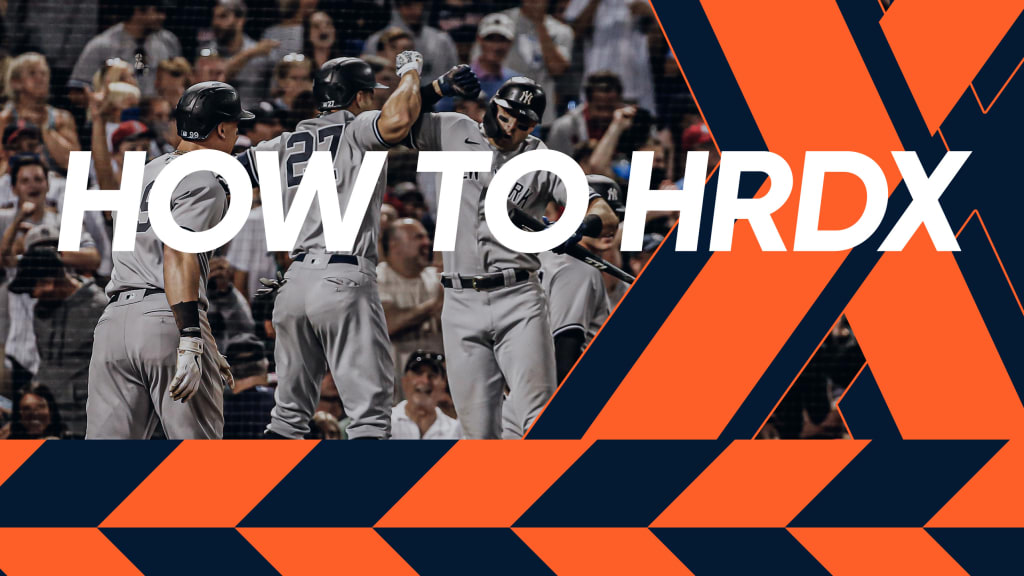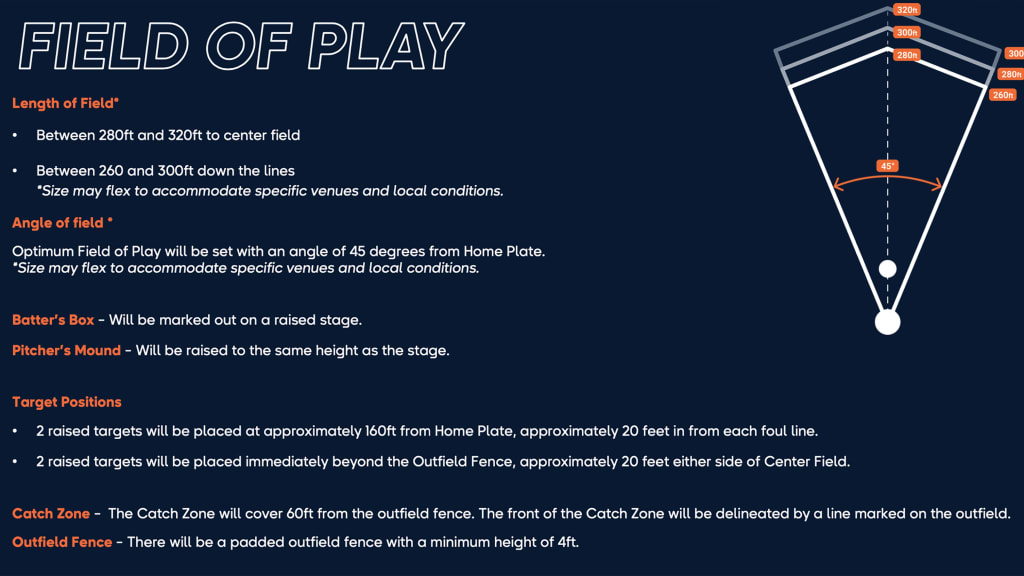
When you arrive at Campo Marte in Mexico City for the FTX MLB Home Run Derby X grand finale on Saturday, your ticket in hand and ready to see some home runs launched into the sky, you may wonder exactly how this is all going to work. Well, have no fear: This article is here to help.
If you're familiar with other home run derbies, players usually got 10 swings or -- as it's now done -- four minutes to hit as many pitched baseballs over the fence. That's essentially the concept behind HRDX, but there are a few twists. Let's break it all down.
The Field
You should know this isn't your typical sporting event from the very start. For one, the atmosphere will feel more like a festival with music and food available all day long. For another, the pitcher and batter will be on a stage. Sure, pitchers usually throw from a mound, but this will be quite different. More like if baseball happened to be played at Coachella.
Finally, the field's dimensions are very different from anything you've ever seen at a baseball stadium. The area of play is a little smaller, with the home run fences brought in and the width of the field at 45 degrees rather than 90 on a traditional baseball field. Forget pulling the ball -- you need to go with an up-the-middle swing.
Because of Mexico City's elevation, the fences have also been pushed back for this final event to make up for the longer flight of the balls.

The Pitches
Batters can take 25 swings, but they must complete them within five minutes. If they don't, they sacrifice the rest of their swings. Players can also take up to five pitches and call one thirty-second timeout.
How to score
Players will get a point for every ball they hit over the outfield fence. But unlike other derbies, that's not the only way to score points. There will also be four targets for batters to aim for -- two in the infield and two beyond the outfield fence. Hit one of those and get a point -- or if it's over the wall, a bonus point -- as well.
However, this is the first HR Derby to feature defense, too! Opposing players will be in the "catch zone," trying to snag every fly ball. If they manage to catch it before the ball hits the ground, the opposition earns a point.
Finally, batters get a "hot streak" and their points are doubled over the next five pitches. Watch out, though: The defense gets double points for these pitches, too.
Teams
MLB's HR Derby features eight players going head-to-head against each other. HRDX is different because there are four teams made up of four players. After battling for seeding in the first two events, now the teams will compete for the title of overall winner. Here's how they line up:
1. Red Sox - 6 pts
2. Dodgers - 6 pts
3. Yankees - 5 pts
4. Cubs - 1 pt
Players
A former Major League Legend leads each team. They are joined by a Superstar (a women's baseball or softball player), a Rookie (a Minor League player) and a Wild Card (a content creator, who will be training up in hopes of smashing plenty of home runs.)
Here's the roster for each team.
Boston Red Sox
Jonny Gomes, MLB Legend
Jocelyn Alo, Superstar
Liv Cooke, Wild Card
Enmanuel Valdez, Rookie
Chicago Cubs
Geo Soto, MLB Legend
Alex Hugo, Superstar
Spencer Owen, Wild Card
Esteban Quiroz, Rookie
Los Angeles Dodgers
Adrián González, MLB Legend
Ashton Lansdell, Superstar
Yoongy Kwak, Wild Card
Nelson Quiroz, Rookie
New York Yankees
Nick Swisher, MLB Legend
Stefania Aradillas, Superstar
Daniel Corral, Wild Card
Jared Serna, Rookie
Home run terms
You may quickly realize that there are roughly 8,000 ways to refer to a home run (give or take). Here are just a few of the most popular that you can start dropping into conversation:
- homer
- long ball
- dinger
- tater
- jack
- shot
- four-bagger
- blast
- big fly
- going deep
- clout
- round-tripper
- moonshot
- goner
- bomb
- no-doubter
- yickety and/or bammo (these may only be terms used by former Braves player and Hall of Fame infielder Chipper Jones)
There's also a full glossary available here for any other terms that may spring up.
Does this make you hungry for a game of traditional baseball? Is it a sport you've heard of, but have never seen or played before? That's totally OK! Here's a quick primer of some basic rules of the game if you want to explore more.
HRDX may have teams of four, but a baseball game has two teams of nine facing off against each other. Major League and Minor League Baseball also play with a "designated hitter" -- a person who only hits, but doesn't take the field. They usually take the place of the pitcher, except in the case of superstar sensation Shohei Ohtani who does both. He is the only player in the modern game to ever do that.
While HRDX uses "points," baseball uses "runs." A run scores when a player completes a circuit around the four bases -- first base, second base, third base, and home plate, where the batter swings from. Batters can get on base with a "hit" -- hitting the ball and no fielder can catch it in the air or by beating the throw to first base. Hitters can also get on base by drawing a walk -- taking four pitches outside the strike zone -- or being hit by a pitch.
Batters make outs by hitting the baseball to a fielder who either catches the ball on the fly or fields it on the ground and throws the hitter out at a base. Batters can also strike out, either by swinging and missing three times or the umpire calling the third pitch a strike.
Finally, games last nine innings broken into halves, with teams alternating pitching and hitting. Each half is three outs and the home team always gets to bat in the bottom half. The team that has scored the most runs at the end of nine innings is declared the winner. If the score remains tied after nine innings, then the game goes to extra innings. Whoever takes the lead at the end of a full inning (both halves), is the winner and the game is over.
There's lots more to learn about the game and so much nuance you can devote your entire life to it, but that should give you a pretty good starting point. Tune in for some free MLB games -- there's one every day -- or go out and watch a local team and soon you'll be like current Mets manager Buck Showalter, explaining some very bizarre rules:
